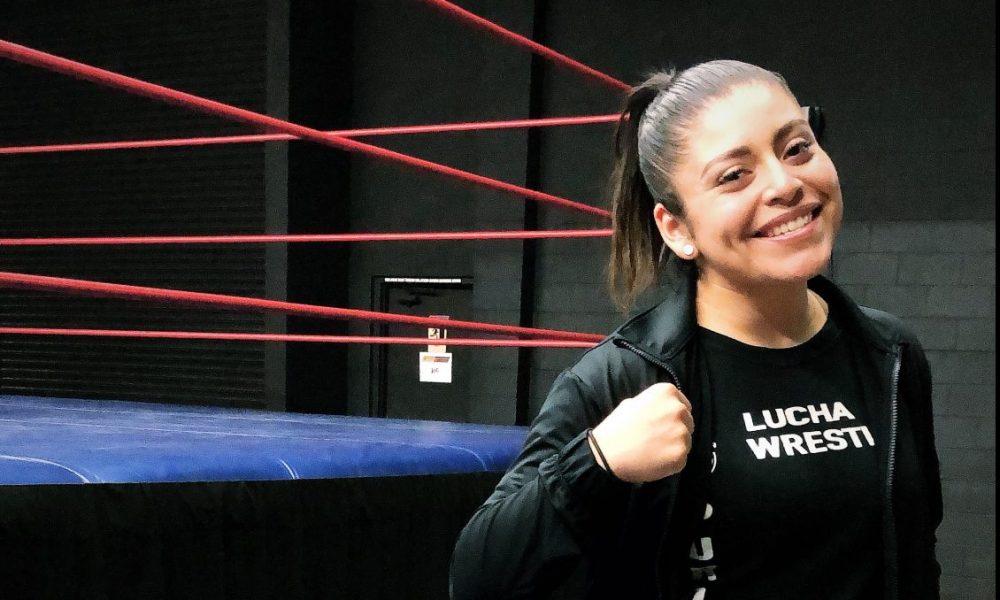

Today we’d like to introduce you to Daisy Rivera.
Daisy, can you briefly walk us through your story – how you started and how you got to where you are today.
The root of any and all my inspirations has always been my hero, Eddie Guerrero. When I think of what inspired my love for wrestling, and what I do outside of wrestling—which is school social work, I always begin with Eddie Guerrero. Why? Well, not only was he a tremendous athlete and wrestler—far beyond that, he was an incredible storyteller. At the age of 11, his athleticism and incomparable in-ring presence captivated me, but what drew me in was his ability to make me believe and feel. It was his innate ability to make me hand over my emotions to him and all he did—to invest my own emotions and feelings into every word he said and every maneuver he performed.
Because of his ability to invest me in all he did, I finally found a world I could co-create with my hero—a world in which we, fans and wrestlers alike, create this timeless emotional vocabulary that allows us to share our own views of the world and deepen our understanding of it in order to navigate the challenges and triumphs that come with our daily lives. It is here where I make a connection between my love of wrestling and my involvement in social work: Wrestling gave me the emotional vocabulary I needed to process my own unobserved trauma and pain, and Eddie Guerrero was the narrator behind that language. It was the story and storyteller that made me fall in love with wrestling and created in me the desire to uplift others and see them succeed.
Overall, has it been relatively smooth? If not, what were some of the struggles along the way?
My biggest goal as an up and coming wrestler is to make people believe in the magic that is wrestling. To believe in those with whom they identify with. I believe that in our own lives, we are our own biggest heroes and antiheroes, and who we are is often reflected in many of the wrestlers we root against and/or cheer for. I say this because as an adolescent, I experienced a lot of trauma and depression that came as a result of my family dynamics. On two occasions, my own unobserved and unprocessed pain lead to me being placed in the back of a police vehicle with handcuffs around my wrist, and on the way to an in-patient facility for teenagers. While I was there, I was able to see the need for adults and well-equipped mental health professionals to support the mental and social-emotional needs of children and adolescents, and more often than not, they are non-existent where they are needed most.
When I came to this realization, I was forced to acknowledge that even if my pain was the result of all the physical and mental damage I received from my family, the resilience I needed to overcome and heal was not the responsibility of those who caused that damage or those who I was “handed to” while in treatment. The responsibility to heal and overcome was on me—and I was able to do that through my own love for wrestling. If I can captivate the mind of a child, an adult, or elder, and bring them to invest themselves in who I am, what I say, and the story I aspire to tell through professional wrestling, so that they may overcome any challenges they are experiencing, then I will have achieved my purpose in wrestling.
We’d love to hear more about your work and what you are currently focused on. What else should we know?
One of the things I am most proud of since I began my training to become a wrestler are the opportunities that have come to wrestle in different cities and the names I have been able to share the ring with. As a combat sport, wrestling demands that you are at your best physically, but also mentally and emotionally. Training is very demanding, and the ability to keep going despite the physical challenges is mostly mental. I say this because in order to make it in wrestling, you need the mental fortitude to believe in yourself despite the big names that already exist in wrestling. Since beginning to wrestle in August of last year, I’ve had the privilege of sharing the ring with world-renowned talent and semi-main event for those names. To have been able to achieve that in less than a year of wrestling professionally is something I am so proud of because of how unheard of it is.
What is “success” or “successful” for you?
In wrestling, the metrics for success vary—and although many would resort to champion reigns, for me success is defined through how many opportunities come your way as a result of your wrestling. Promoters and bookers are always looking for fresh talent that stands out with their style of wrestling. In my case, I am fortunate enough to train at a wrestling school in which American, Mexican, and Japanese wrestling are taught. When you combine all three variations, you present a hybrid of wrestling American crowds too often don’t see. When your wrestling is able to produce a reaction from the crowd, promoters and bookers notice, and that’s when more opportunities start coming your way.

Suggest a story: VoyageLA is built on recommendations from the community; it’s how we uncover hidden gems, so if you or someone you know deserves recognition please let us know here.



















